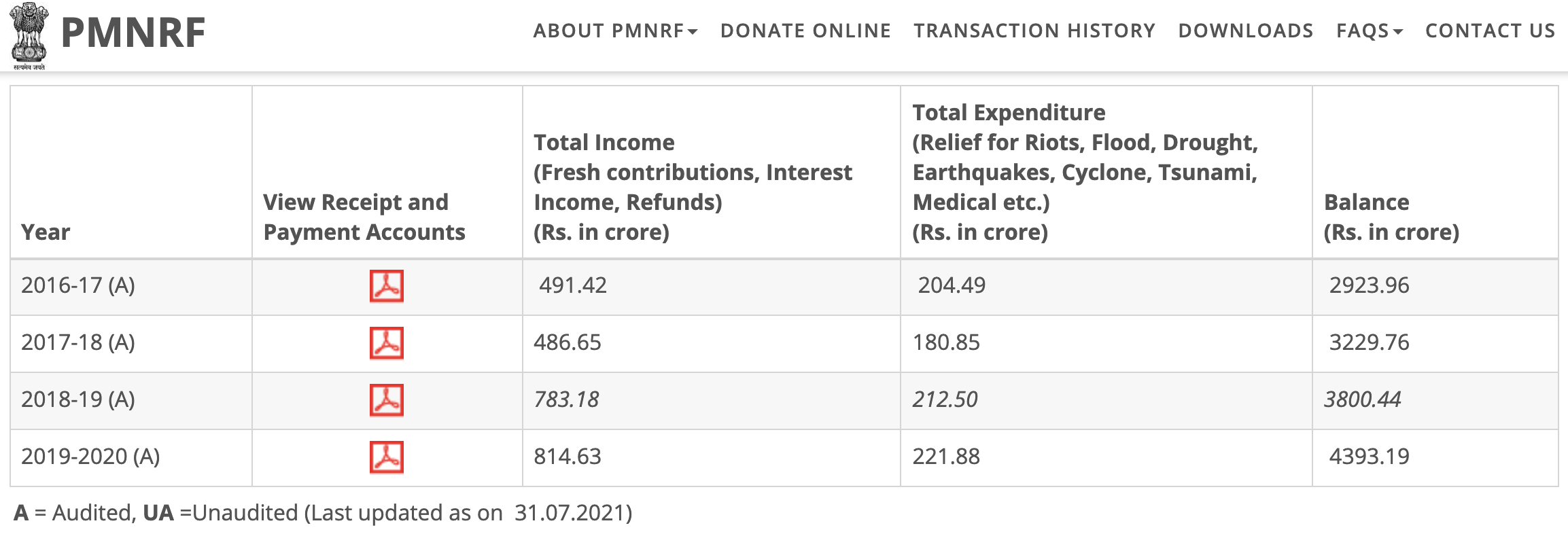
India, along with every country of the world, was dealt a rude and unexpected blow with the Covid pandemic around Feb-Mar’20. Each country adopted several means, financial and non-financial, to deal with it in the best way they could. India too immediately deployed a series of measures to arrest the further spread of the virus and assist those in need.
On 27 March 2020, the Centre set up the Prime Minister's Citizen Assistance and Relief in Emergency Situations (PM-CARES) Fund for receiving donations from individuals and corporations for disaster relief efforts during the Covid pandemic and similar emergency situations. The PM-CARES Fund was set up as a public charitable trust registered under the Registration Act, 1908 with the Prime Minister designated as the ex-officio chairman and the Home Minister, Finance Minister, and Defence Minister as its ex-officio trustees.
No sooner than the fund was announced, thousands of crores of rupees in donations started pouring in from all corners of India and abroad. Within a few days of the launch, the fund had a corpus of ₹3,076.62 crores, all of which were received in "voluntary donations". The government claims that significant amounts from the proceeds were spent on purchasing ventilators, oxygen cylinders, vaccines, among other things in the fight against Covid-19.
So, all this happening must only be a good thing, isn’t it? Except it wasn’t, as the Fund raked up a huge controversy as soon as it was announced. The political brass, as well as the civil society, raised pointed questions, most of which remain unanswered until this date.
Key concerns with the PM-CARES fund
- The primary concern centered around the need to start a new fund in the first place. The government of India already has a similar fund called the Prime Minister National Relief Fund (PMNRF) in place since 1948. The purpose of PMNRF, according to its charter is to "render immediate relief to families of those killed in natural calamities like floods, cyclones, and earthquakes, etc., and to the victims of the major accidents and riots." As of Mar 2020, the PMNRF fund had a balance of ₹4,393 crores which could easily have been used for Covid-19 relief efforts.

Why did the government not publicize and encourage contributions to PMNRF? In the one-year period between Jul’20 and Jul’21, the contribution received in PMNRF from individuals, institutions, and through funds raised by invoking corporate social responsibility was only ₹81,115. On the contrary, on March 14, in an unprecedented move, the Home Ministry declared the coronavirus outbreak in the country a “notified disaster”, thereby enabling the Central and State governments to use the money from PMNRF and the State Disaster Relief Fund for Covid relief efforts.
- Prime Minister Narendra Modi became the de-facto face of the government in leading the fight against the Covid-19 pandemic. Given BJP’s infamous penchant for branding and self-promotion through each of its schemes and with this fund too set up under a craftily worded acronym (PM-CARES), it immediately raised pointed questions - "What came first? The name of the fund or the acronym?”, "Was this yet another exercise of self-promotion under the name of community service?". Though, in principle a noble effort to help the needy, it now carries with it huge baggage of skepticism which is coloring the ongoing discussions on the subject even further.
- Given the thousands of crores received and because it was a government (public) fund, it was but natural for citizens to demand transparency on the collection and disbursement of the funds. Accordingly, many RTI applications were filed by various activists. The government rejected all RTI applications and refused to provide any details to anyone. The government claimed that PM-CARES is not a "public authority" and only a "charitable trust" for which contributions are made voluntarily, unlike the PMNRF for which funds are made available through budgetary allocations. As a result, PM-CARES is not covered under the RTI Act and that divulging details about the fund is not viable as it would cause an "unwarranted invasion of privacy".
The argument that the PM-CARES fund is not a government-controlled entity and merely a charitable trust blew the lid completely and opened the gates to several appeals in the courts to force the government to provide transparency on the fund's operations. The government did agree to offer transparency but only in the form of an audit report, except that the auditor was not the Comptroller and Auditor-General (CAG) of India, but a private auditor appointed by the government itself. It even denied giving access to the Public Accounts Committee (PAC), one of the most important cross-party parliamentary panels which scrutinizes key reports by the auditor general and has taken up issues like the 2G spectrum scandal in the past, to investigate the accounts of the Fund. The government's stand obviously did not satisfy the various activists and concerned citizen groups who have cited various arguments to maintain their position that PM-CARES should be considered a public authority and come under the purview of the RTI Act.
Arguments challenging PM-CARES as a private Charitable Trust
- The PM-CARES fund bears our national emblem, but the central government insists that it is not a government fund. The Prime Minister’s Office (PMO) through the PIB even issued a press note appealing for donations to the Fund creating a perception of it being a Government of India collection drive.
- While the PM-CARES trust has been registered with the revenue department of Delhi, with the Prime Minister as chairperson and the Home Minister, Finance Minister, and Defence Minister as trustees, the government yet does not define it as a government trust. In its defense, it references point 5.3 of the Trust Deed which states, "The trust is neither intended to be nor is in fact owned, controlled or substantially financed by any government or any instrumentality of the government. There is no control of either the central government or any state governments, either direct or indirect, in the functioning of the trust in any manner whatsoever” based on which the PM-CARES fund cannot be considered a public authority and thus exempted from RTI scrutiny.
- Two days after the launch of the Fund, PM Narendra Modi held a video conference on Covid-19 with the heads of Indian embassies across the world. Thereafter 27 Indian embassies promoted and publicized PM-CARES on their websites and social media platforms. So, the question is why did the government missions abroad get involved in promoting a private Charitable Trust?
- A day after the Fund was registered, the Ministry of Corporate Affairs issued an Office Memorandum qualifying PM-CARES as a corporate social responsibility (CSR) initiative to receive corporate donations. While issuing the memorandum, it is learnt to have defined PM-CARES as a "fund set up by the central government", according to an RTI accessed by activist Anjali Bhardwaj. But the trust deed of the Fund registered a day before (March 27) said it was not government-run and thus PM-CARES could not have been eligible for corporate donations. It was only 2 months later (May 26) that the Corporate Affairs Ministry added PM-CARES Fund to the Companies Act retrospectively from March 28. As a result, for two months, PM-CARES was a private entity receiving corporate donations. However, this exception was not extended to State disaster relief funds which essentially restricted the State’s ability to combat the pandemic locally and rely almost exclusively on the Centre for funding. And there are quite a few incidents of favoritism in Covid relief citied by CMs of non-BJP ruled states already in the public domain.
- Despite PM-CARES being registered as a public charitable trust under the Registration Act, 1908, it received an exemption from the operation of all provisions of the Foreign Contribution (Regulation) Act, 2010, or FCRA. This allowed the fund to receive donations from foreign individuals and entities. Why is a special (maybe even only) exception provided to a Charitable Trust in India when the government is coming down hard on various NGOs and freezing their bank accounts citing a lack of transparency in their foreign funding?
- The Fund is allocated the “http://pmcares.gov.in” domain name by the National Informatics Centre (NIC) which is reserved only for public authorities. RTI applications filed to know the rationale behind the Ministry of Electronics and Information Technology (MeitY) making an exception for this Fund to be granted a “.gov.in” domain too was rejected. The reason cited here too was that PM Cares is not a public authority and hence outside the ambit of the RTI act.
On 17 Aug 20, the Supreme Court of India passed a verdict refusing to order the transfer of PM-CARES funds for Covid relief to the PMNRF National Disaster Response Fund that would bring it under the RTI purview. Congress leader P. Chidambaram echoed the Opposition's and many citizens' sentiments when he said that this decision "will be contested for a long time in academic circles”.
The government has continued to defend its position and to this date, the subject continues to occupy a prime position in all public debates. Just as the government, you too can pick your arguments based on what suits you best.
TO READ THE FULL ARTICLE

Get full access to the exciting content on The Mirrority by logging in
Support independent journalism
Even the very best of media houses in our country today are yielding to the pressure of click-bait journalism in order to survive. More than ever before, our country needs journalism that is independent, fair and non-pliant to the bureaucracy. Such journalism needs the support of like-minded readers like you to help us survive editorially and financially.
Whether you live in India or India lives inside you, help us continue to produce quality journalism with your contribution.
CONTRIBUTE
